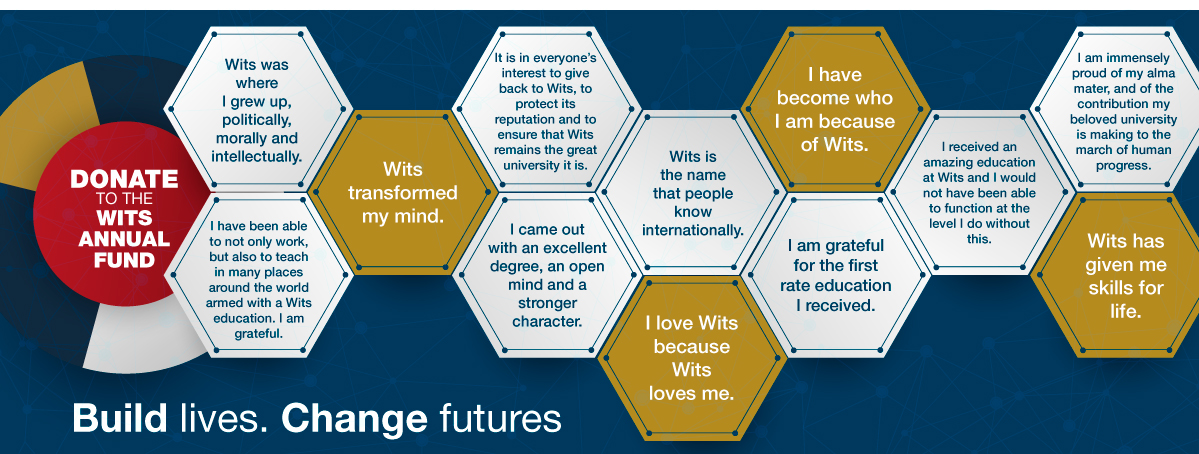
Stories of giving
The Wits Annual Fund in Support of Wits 100 is inspired by examples of life-changing generosity
Lives changed
- In July 2023 the Josh Fund hosted an event in Seattle to honour and celebrate the 30th birthday of Josh Markowitz, son of Stephen (BSc 1989, BSc Hon 1990, PDipEd 1991), who died tragically in a hit-and-run collision. The Josh Fund ensures that Josh's musical legacy lives on by supporting young musicians as they pursue their dreams.
In 2022 the Josh Fund awarded a scholarship to Sibonelwesihle Kodisang. He is a talented jazz saxophonist currently in the fourth year of his Bachelor of Music degree at Wits. Recently, the Wits Music Department expressed immense pride in his academic achievements, highlighted his growth, maturity, dedication to his studies, and emerging leadership qualities.
Wits Fund board member and alumna Lindiwe Tardif (BCom 1995) made a heartfelt speech about this act of kindness and shared how her life was transformed by the generosity of others.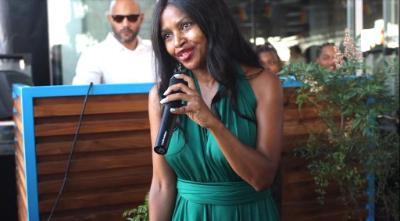 She said: “As I stand here today, I'm reminded of my own beginnings in Soweto growing up under apartheid. I lived under apartheid for 20 years at a time when the "separate and unequal" system of education, known as Bantu Education, was in place. In those days, someone like me could only get access to a great education in private schools which had opened their doors to students of colour, in defiance of apartheid. But these schools were very expensive, and my mom's pockets weren't deep enough for them. Luckily, her employer (BMW South Africa) stepped in to help out and I was able to attend and graduate from one of these "open" junior and high schools, Sacred Heart College, and to go from there to earn three degrees from Wits, qualify as an attorney, move to the US, earn a fourth degree from Boston University, and have the opportunity to work for corporates like EY, Amazon, and Slalom. Without the generosity of others, I wouldn't have had access to quality education and I would have remained a victim of apartheid.
She said: “As I stand here today, I'm reminded of my own beginnings in Soweto growing up under apartheid. I lived under apartheid for 20 years at a time when the "separate and unequal" system of education, known as Bantu Education, was in place. In those days, someone like me could only get access to a great education in private schools which had opened their doors to students of colour, in defiance of apartheid. But these schools were very expensive, and my mom's pockets weren't deep enough for them. Luckily, her employer (BMW South Africa) stepped in to help out and I was able to attend and graduate from one of these "open" junior and high schools, Sacred Heart College, and to go from there to earn three degrees from Wits, qualify as an attorney, move to the US, earn a fourth degree from Boston University, and have the opportunity to work for corporates like EY, Amazon, and Slalom. Without the generosity of others, I wouldn't have had access to quality education and I would have remained a victim of apartheid.
"My journey shows how a simple act of kindness – of investing in someone’s education can create a ripple effect of positive change that transcends time and borders. I carry this appreciation in my heart and am driven to pay this kindness forward by advocating for equal educational opportunities for all so that others, regardless of their circumstances, can also benefit from the transformative power of generosity and education.” READ MORE Nobel laureate Prof Sydney Brenner (BSc 1945, BSc Hons, 1946, MBBCh 1951, DSc honoris causa 1972), aged 90, was a bursary student at Wits. The son of an illiterate immigrant, he was only 18 when he first graduated.
- Nonhlanhla Masina (BSc 2010, BSc Hons 2011, MSc Med 2017) is the Co-Founder and Chief Development Officer at the African School of Excellence. Born and raised in Tsakane, she walked eight kilometres each day to attend Buhlebemfundo High School, where she was named Best Female Learner as a matriculant in 2006. She is among six regional winners in the 2021 Dedicated Teacher Awards. She believes education should be for everyone.
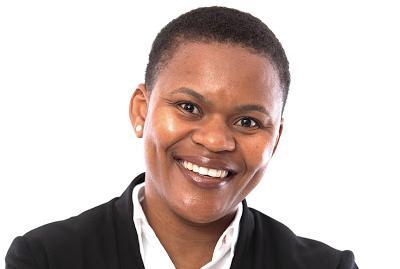 Amanda Dambuza (BA 1999) is an entrepreneur, founder and CEO of Uyandiswa – a management consulting firm launched in 2013. She is also founder and director of Leadership Development Strategies which offers mentoring, coaching, talent management and team development. She has a history as Chief Information Officer at Barclays Africa, and Financial Services Director of JSE listed Adapt IT. She was a guest speaker at World Economic Forum Cape Town in 2019. She serves on several boards and directorships.
Amanda Dambuza (BA 1999) is an entrepreneur, founder and CEO of Uyandiswa – a management consulting firm launched in 2013. She is also founder and director of Leadership Development Strategies which offers mentoring, coaching, talent management and team development. She has a history as Chief Information Officer at Barclays Africa, and Financial Services Director of JSE listed Adapt IT. She was a guest speaker at World Economic Forum Cape Town in 2019. She serves on several boards and directorships.
Her book Baked in Pain: Your Traumatic Past May Be Just the Fuel You Need to Soar details the obstacles she had to overcome. She recalls in an interview with Joanne Joseph on Radio 702, about her experience of registering at Wits.
“The only money I had in my pocket was R5 to catch the two-hour train ride back to Orange Farm from Park Station. I remember sitting at the registration counter trying to get the lady just to listen to me. All I was hoping for was some kind of guidance. I didn’t know how to fill in a form or what I was going to study.”
She was turned away because she didn’t have the required R4 000 for registration. But undeterred she returned the next day. “Eventually someone listened and I was sent to the guidance office. It was the best thing. I got to talk to a psychologist.”
From here she confronted the trauma of being abandoned by her parents and hurt by adults entrusted to look after her. “I wanted to prove to myself that I will not amount to nothing.” Dambuza has another book A Brave Girl Named Aya, aimed at a younger audience to introduce difficult conversations around abuse and violence. She is passionate about personal mastery and instilling hope.
- Twenty first-year students were awarded the Vice-Chancellor’s Scholarship in recognition of their exceptional achievement in matric. Ten are Equality Scholarship recipients drawn from schools in the poorest communities.
- Targeting Talent is a donor-funded programme to support Wits students from disadvantaged backgrounds. Alumna Tumelo Marule tells eTV how it helped her.
- Once a child labourer on a farm, chemistry graduate Maletsela Phineas Letsoalo now has his own business as a supplier to the mining industry – thanks in part to people who cared enough to give him options in life.
- Siblings Dakalo and Rendani Mbuvha, from rural Limpopo, both qualified as actuaries.
- The Thuthuka Bursary Fund helped Zanele Maduna from Sebokeng to graduate with a Wits BAcc and HDipAcc. “As a student who did accounting for the first time at university I don’t know how I would have survived without the TBF support tutorials. We also got a qualified CA(SA) as a mentor and life coach. Those coaching sessions meant the world to me,” she said.
- Wits alumna Mary Vilakazi (BCom 1999, BCom Hons 2000), who will soon take on the role of CEO of FirstRand in 2024, grew up in Alexandra township. She told CFO magazine about the difference that financial support had made to her. It wasn’t a question of being especially clever, she said, but one of exposure to opportunity.
- Another Alex resident, Seropane ‘Abner’ Lesoka, spoke about the loneliness of struggling for an education without help, and the difference made by the Alexandra Education Committee, founded by Wits honorary degree recipient Deane Yates.
- The AECOM Educational Trust allowed Nontuthuzelo Mlotshwa to aim for Wits a mining engineering degree and the chance to make a contribution and earn respect.
- Wits student Nothando Kunene told the Mail & Guardian about her long struggle to get a degree in accounting.
- Wits education graduate Yandiswa Xhakaza gave a TedX talk about the experience of young South Africans in our basic education system.
Generous actions
- The Zola Wits Dental Clinic has been refurbished and re-equipped 15-chair, state-of the-art facility for community-based training and clinical services in Zola, Soweto. The project was made possible by a generous donation from the Stanley, Marion, Paul and Edward Bergman Family Foundation to Wits University’s Centenary campaign.
- Rodney Cohen (BCom 1965, LLB 1967) looks back fondly at the years spent at Wits. In this video by Les Glassman in Israel, Cohen expresses gratitude for all his rich experiences at a time when student fees were more affordable.
- Wits Chancellor and retired Deputy Chief Justice Dikgang Moseneke has set an example by donating the arbitration fees he earned from presiding over the Esidimeni hearings. He gave his fees to “chosen law schools that will hopefully help nurture young women and men committed to the high values of our Constitution and to the calling to defend the vulnerable against the abuse of the high and mighty”.
- Mayo Clinic cardiologist Professor Farouk Mookadam (MBBCh 1983) started at Wits Medical School in 1973 but had to delay his studies for financial reasons when his father died. He later returned, persisted and qualified -- and has had an illustrious career in Canada and the USA. He was one of the Class of 1983 who donated towards the Phillip V Tobias Health Sciences Building, saying: “We make a living by what we get. We make a life by what we give.”
- Witsies Neil Tabatznik, Godfrey Phillips and John Gear have created a way for health sciences alumni to contribute their skills where these are desperately needed: the Tshemba Foundation.
- Wits alumnus and artist Marco Cianfanelli (BA FA 1993) donated royalties from his coin design to the Nelson Mandela Children’s Hospital.
- Celebrity actor, entrepreneur and Wits graduate Maps Maponyane (BA 2013) started a crowdfunding platform, BursaryNetwork, to help students cover their fees. Donors can choose the student they wish to support.
- Linguist and alumnus Professor Desmond Cole (who shares a birth year with Wits) and his wife Naureen are generous donors to Wits University. Their advice to students: “Make the most of [the experience], whether your parents are paying, you’ve received a loan, or you yourself have worked and saved. It’s a very precious time in your life.”
- Speaking at the New York Stock Exchange when he was honoured as the 2017 CEO of the Year by Chief Executive Magazine, Wits alumnus Stanley Bergman said: “Here is my appeal to all business leaders: We cannot leave people behind. Too many in business have been too focused on going fast and not focused enough on going together. The result is a minority of huge beneficiaries and an increasingly vocal majority of those left behind. If we focus too much on the speed of change rather than ensuring that all benefit from change, then we risk greater disenfranchisement and civil dissent, which jeopardizes global stability and all democratic societies.”
- Mining company Sibanye has invested R15-million in the Wits School of Mining Engineering. It will go towards producing new skills and knowledge for the mining industry of the future.
- FirstRand directly targeted the skills it needs by funding three students – Elvis Seshoene, Lethabo Felicia Makumula and Kelisha Moodley – to specialise in computational finance.
- Insurance company Auto & General awarded a bursary of R200 000 to Moleboheng Motsoeneng, a student from Diepsloot, to study towards a BSc at Wits.
- Tata Africa has donated over R7.5-million to Wits since 2007.
- The Gauteng Institute for Architecture and Marley Building Systems awarded bursaries worth R150 000 to architecture students.
- The Institute of Information Technology Professionals awarded a bursary to Keamogetswe Lebuso, from Tembisa, to study towards a BSc in computational and applied mathematics at Wits.
- The Construction Sector Education and Training Authority (CETA) has awarded R91-million for projects at Wits.
- Wits graduates Tshepo Mosaka (law) and Keyan Jardine (African history) received postgraduate scholarships from FirstRand to study in the UK.
- The Absa Scholarship Programme has sponsored more than 2000 students to date – 10 times more than the bank’s initial target. Handing over R15-million to Wits, Sazini Mojapelo, Absa’s Citizenship Division Head for Africa, said: “It is not only about fees but about how we keep these great institutions of learning alive for future generations.”
- The South Africa Music Rights Organisation awarded bursaries to two Wits students, Nandipha Mnyani and Mihi Matshingana, giving them hope that they would realise their dreams.
- One Witsie musician who has already made it is Danny Koppel. In this radio interview, he talked about his attitude to money.
- The Peermont Education Trust is a regular supporter of students and offers more than finance.
- Wits and other universities have recently been awarded a generous grant from the Andrew W Mellon Foundation for a Programme in African Digital Humanities. The Programme will offer R3-million annually over five years in support of projects of digitisation, course design and research.
-
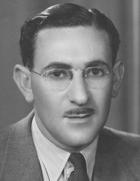 Dr Max Chitters (MBBCH, 1940), originally Chitiz was born in 1915 in Johannesburg to Lithuanian parents, he was raised as an orphan after the untimely death of both parents. He obtained his MBBCH from Wits in 1940, which he was able to do after receiving a scholarship. Thereafter he served with the South African military forces in the Middle East and Europe until 1945. Returning to Johannesburg in 1947, he established a private practice in Dermatology. He became very well known in his community, for treating many patients who could not afford to pay.
Dr Max Chitters (MBBCH, 1940), originally Chitiz was born in 1915 in Johannesburg to Lithuanian parents, he was raised as an orphan after the untimely death of both parents. He obtained his MBBCH from Wits in 1940, which he was able to do after receiving a scholarship. Thereafter he served with the South African military forces in the Middle East and Europe until 1945. Returning to Johannesburg in 1947, he established a private practice in Dermatology. He became very well known in his community, for treating many patients who could not afford to pay. 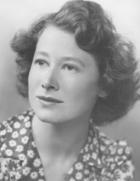 He married Charlotte Ossher in 1949. They have 3 children, Carol, Gerald and Lola. Gerald followed in his father’s footsteps at Wits, obtaining his MBBCh in 1978. Max and his family left South Africa for the USA in 1978 where he continued to practice Medicine until the age of 75. He passed away in 1997 at the age of 82.
He married Charlotte Ossher in 1949. They have 3 children, Carol, Gerald and Lola. Gerald followed in his father’s footsteps at Wits, obtaining his MBBCh in 1978. Max and his family left South Africa for the USA in 1978 where he continued to practice Medicine until the age of 75. He passed away in 1997 at the age of 82. Dr Chitters and Mrs. Chitters have awarded a bequest to Wits University as part of the Chitters Trust.
Pushing Boulders
- Athol Williams (BSc Eng 1992) grew up in Mitchells Plain, but refused to be limited by any apartheid plan. In the mid-1980s he taught himself some of the school subjects he needed to get into Wits, and he got a scholarship and completed his first degree. By his late 20s he was a successful engineer and business consultant in a top international firm. But he felt he couldn’t be free until others were free too. At the age of 40 he gave up his career to start a non-profit literacy organisation, Read to Rise, which has given books to thousands of South African children. “I’ve committed myself to public service,” he said.
Hear more about his journey in this inspiring radio interview.
- He got 100% for Matric maths at the age of 15 by teaching himself. Then the life of Musa Manzi – now a professor of geophysics at Wits University – turned tragic. What stopped him from jumping to his death as he had planned? Read his story as told to Susan Bentley.
RAG: Remember and Give
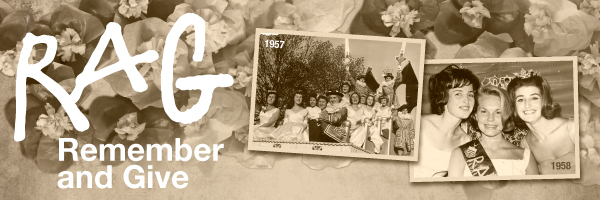
Remember the Rag parade? Back in the day Wits students took to the streets in an annual procession of floats and fancy dress, collecting donations and selling the “Wits Blitz” magazine. The day would culminate in the election of a Rag Queen and an elegant ball, also in the name of fundraising.
Rag started in 1922 “to coincide with the official inauguration of the University and its first graduation,” writes Bruce Murray in Wits: The Early Years. “It took the form of a mock funeral to bury the old School of Mines … The students marched from Plein Square to the Town Hall.” In 1923, vehicles were decorated to illustrate various student activities.
In 1925, the students staged a daring hoax when they got a traffic cop, Constable Gert Coetzee, to impersonate the Prince of Wales – who was actually in town to open Wits’ Central Block, and who gave his permission for the jape.
Only in 1929 did the event come to be used as a charity fundraiser, initially as the “Hospital Rag”. The first beneficiary was the Johannesburg Radium Fund, set up for the treatment of cancer patients. An amount of £1229 was collected. (A view later developed that raising money for medical care allowed the state to evade its responsibilities.)
The humorous (or not, depending on your cup of tea) magazine appeared first in 1931 and raised nearly £500 that year.
The carnival took a break during World War 2. It resumed in 1945 as the University Rag, though the funds still went to medical and welfare projects, specifically benefiting black and poor white people.
In 1948, Principal Humphrey Raikes tried to stop black students from participating in Rag, as part of the University’s policy of social segregation at the time. The SRC and students defied this order.
In the 1950s, the SRC organised stunts to publicise Rag, including “kidnapping” well-known personalities. The Rag Queen was chosen on the basis of applause. Murray writes: “The Rag committee set the theme for the procession, usually somewhat dull. Float builders spent much ingenuity in translating these to reflect students’ obsessions with alcohol and sex.”

